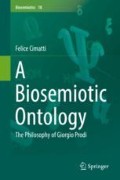Abstract
Why did Prodi, while engaged in his scientific work, begin to study and to write philosophy? In this chapter, I will attempt to answer this question. The guiding idea is that Prodi realized that, in order to truly be a scientist, one needs to reflect on what it means to be a scientist. Otherwise, the scientist loses the intrinsically ethico-political dimension of his or her work. But once Prodi stepped into the philosophical field, he could not stop, since—consistent with his belief in continuity—he realized that every philosophical problem is intimately connected with others. Prodi the scientist becomes Prodi the philosopher.
Critical thought does not begin with a suspension of the usual modalities of knowledge, thus inaugurating a new, purely human, course. Rather, it reflects more carefully on those modalities as they relate to things , therefore grounding itself in the real. Science and critical thought are therefore synonymous.
(Prodi 1974: 147)
Access this chapter
Tax calculation will be finalised at checkout
Purchases are for personal use only
Notes
- 1.
For this reason, Prodi’s theory is an ontology, that is, a description of the structure of the world, based on biosemiotics: a systematic bio-ontology. Prodi’s perspective is similar to that of Buchanan (2008), although his book is never cited. According to Buchanan, “ethology emerges as the significant dimension in framing the being and becoming of the animal. The animal body is interrelated with its environment through the process of behavior, so it becomes a question of how to engage the ontological dimension of this relation” (Buchanan 2008: 5).
BibliographyIn ItalianOther Works Cited
Alač, M., & Violi, P. (Eds.). (2004). In the beginning: Origins of semiosis, Semiotic and Cognitive Studies 12. Bologna: Brepols.
Barbieri, M. (2000). I codici organici: La nascita della biologia semantica. (Capire la vita 1.) Ancona: peQuod editore.
Cimatti, F. (2000a). Nel segno del cerchio: L’ontologia semiotica di Giorgio Prodi. Roma: Il manifesto Libri.
Cobley, P. (2016). Cultural Implications of Biosemiotics, Biosemiotics 15. Dordrecht: Springer.
Eco, U. (2004). Origins of semiosis. In: Alač, Violi 2004: 25–30.
Hoffmeyer, J. (2009). Biosemiotics: An examination into the signs of life and the life of signs. Scranton: University of Scranton Press.
Petrilli, S., & Ponzio, A. (2005). Semiotics unbounded: Interpretive routes through the open network of signs. Toronto: University of Toronto Press.
Prodi, G. (1989b). Biology as natural semiotics. In W. Koch (Ed.), For a semiotics of emotion (pp. 93–110). Bochum: Brockmeyer.
Bolhuis, J., Brown, G., Richardson, R., & Laland, K. (2011). Darwin in mind: New opportunities for evolutionary psychology. PLoS Biology, 9(7), e1001109.
Brenner, E., Stahlberg, R., Mancuso, S., Vivanco, J., Baluška, F., & Van Volkenburgh, E. (2006). Plant neurobiology: An integrated view of plant signaling. Trends in Plant Science, 11(8), 413–419.
Deacon, T. (1997). The symbolic species, the co-evolution of language and the brain. New York: Norton.
Dobzhansky, T. (1968). On some fundamental concepts of Darwinian biology. In T. Dobzhansky, M. Hecht, & W. Steere (Eds.), Evolutionary biology (pp. 1–34). New York: Springer.
Author information
Authors and Affiliations
Rights and permissions
Copyright information
© 2018 Springer Nature Switzerland AG
About this chapter
Cite this chapter
Cimatti, F. (2018). Scientist Because Philosopher, Philosopher Because Scientist. In: A Biosemiotic Ontology . Biosemiotics, vol 18. Springer, Cham. https://doi.org/10.1007/978-3-319-97903-8_3
Download citation
DOI: https://doi.org/10.1007/978-3-319-97903-8_3
Published:
Publisher Name: Springer, Cham
Print ISBN: 978-3-319-97902-1
Online ISBN: 978-3-319-97903-8
eBook Packages: Biomedical and Life SciencesBiomedical and Life Sciences (R0)

